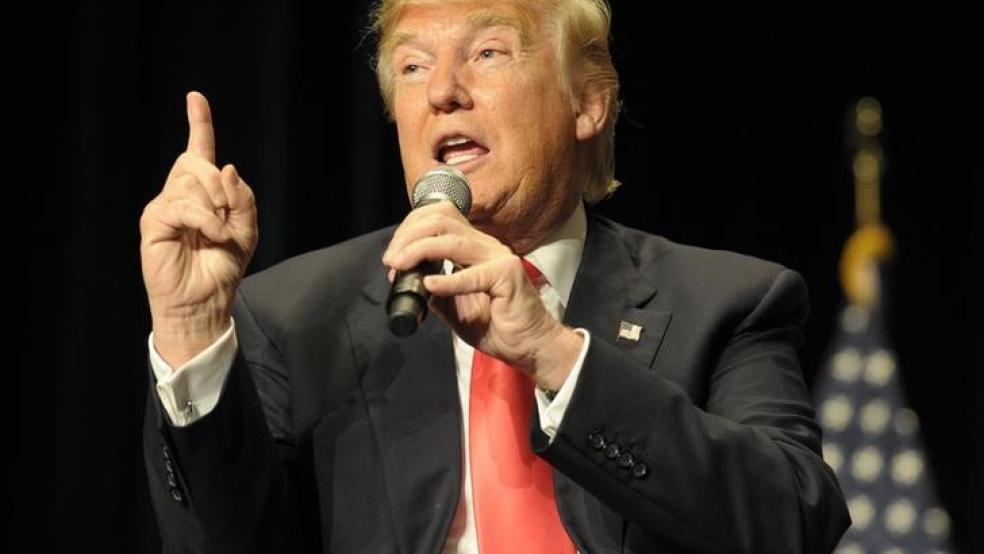Casino magnate Donald Trump placed a big bet on last night’s Iowa caucuses, and came up a loser. His chief rival for the Republican presidential nomination, Texas Sen. Ted Cruz, won a solid victory, taking 28 percent of the vote to Trump’s 24 percent, even as Trump barely held off Florida Sen. Marco Rubio, who finished with 23 percent.
“God bless the great state of Iowa,” Cruz began in his victory speech. “Let me first of all say: To God be the glory.”
Related: Is This How Trump Would Shrink the Government?
Cruz had bet on the effectiveness of a good old-fashioned ground game in Iowa, combined with assiduous attention to the state’s large number of evangelical Christian voters, whom he acknowledged in the first sentence of his speech.
Trump, by contrast, had essentially gambled that by sheer force of personality he could drive the voter turnout he needed to win the Hawkeye state caucuses, while avoiding the long slog of retail politicking that most candidates have to endure there. He figured he could assuage the evangelicals’ concerns with symbolism, such as showing up at a church the day before the caucuses – even if rather than accepting communion from a passing tray, he threw some cash on it instead.
In the end, despite polls in the final days that suggested otherwise, Cruz was right, and Trump was wrong.
Trump’s loss in Iowa provides some breathing room not just to Cruz and Rubio, but also to a Republican Party that has been struggling to define its role in a primary where the two frontrunners, Trump and Cruz, are openly hostile to it.
Related: Is This How Trump Would Shrink the Government?
“Whatever the party leadership might want, we’re not going to get much clarity until after New Hampshire,” said Kyle Kondik, managing editor of Sabato’s Crystal Ball at the University of Virginia’s Center for Politics.
“As of now, there’s a glut of candidates competing for the party’s establishment support – Christie, Bush, Kasich, and Rubio, although he’s less of an insider than the other three. Not all of these candidates can do well in New Hampshire. After that race, one would expect to see the party leadership try to intervene to the extent they can, to winnow the contest.”
Had Trump won Iowa, he would have moved on to New Hampshire and South Carolina in the next two weeks, where he is heavily favored, and might have built up some hard-to-check momentum. But his performance Monday had the opposite effect. Leading in all the major polls beforehand, he didn’t only fail to win, he also barely avoided coming in third. For a candidate whose stock in trade is winning, that isn’t a good look.
Rubio, despite finishing third, delivered a speech that, to someone who didn’t know the actual results, would have looked like a victory lap. And he, as much as Cruz, earned it by defying expectations.
Related: Here’s the Big Advantage Ted Cruz Has as Voting Begins
What comes next is a series of three primaries in four weeks, in which Trump needs to reestablish his reputation as a winner.
Following last night’s Iowa caucuses, the candidates converge on New Hampshire, which votes a week from today. As is the case in most of the earliest primary states, Trump holds a clear advantage in the Granite state, leading most polls by between 20 and 25 percentage points over Cruz.
In South Carolina, which votes 11 days after New Hampshire on February 20, Trump is ahead of Cruz by between 15 and 20 percent in most polls. Nevada, the fourth state to choose, has been more lightly polled than the other early states, but Trump leads there, as well, in the most recent survey.
An important thing to take into consideration when looking at the early state results is just how small a fraction of the electorate they represent. There will be 2,472 Republican delegates to the nominating convention in July, meaning that the eventual nominee will need 1,237 to win.
Related: The Stranger than Fiction Trump Controversy You Don’t Know About
Iowa sends 30 total delegates to the convention – meaning that the votes last night counted for about 1.2 percent of the overall total. New Hampshire will send 23, South Carolina 50, and Nevada 30.
That means that by the time ballots are counted in Nevada later this month, that total will have risen only to 5.4 percent.
While the results of the next few states’ elections aren’t something any candidate can dismiss, they are also no sure indicator fof who will be the eventual nominee.





